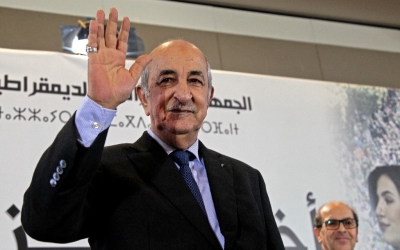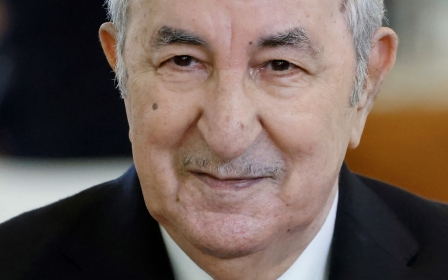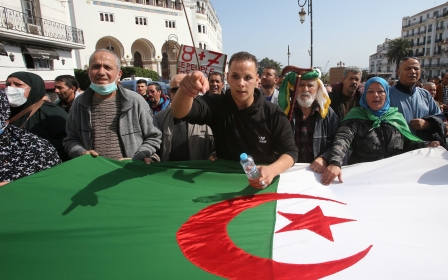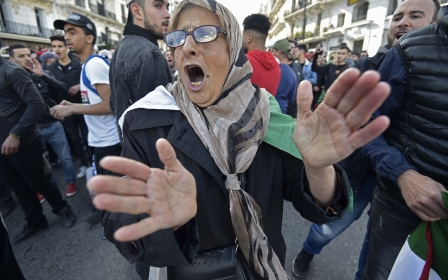Algeria: A presidential election in a climate of repression
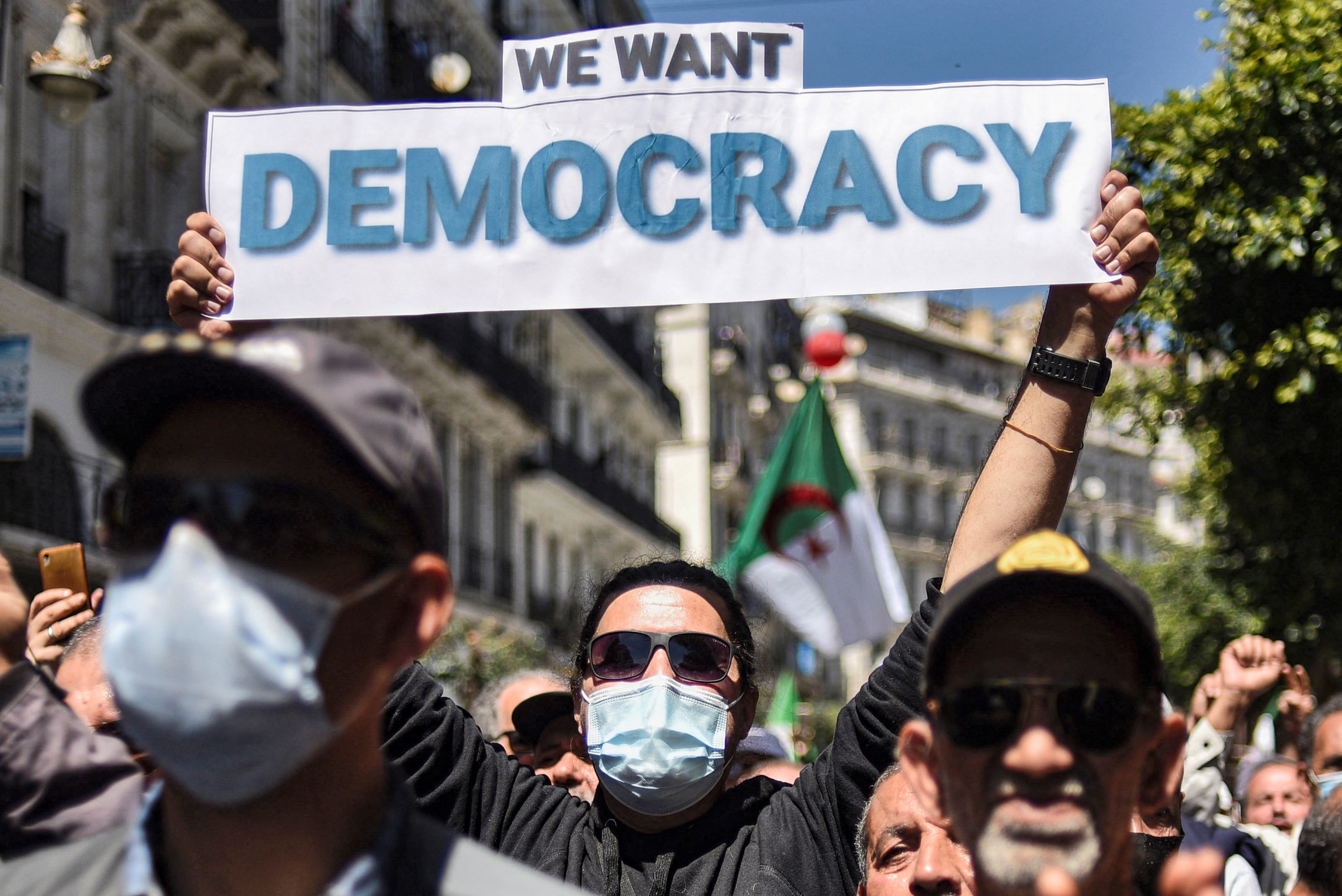
Amine*, a 45-year-old former Algerian journalist who left his country for Paris two years ago, remembers with nostalgia the wave of hope that seized Algiers' newsrooms in February 2019 during the Hirak, the popular uprising that led to the downfall of long-time autocrat Abdelaziz Bouteflika.
"A breath of freedom had blown over the country," Amine, who worked for a media outlet in the Algerian capital at the time, told Middle East Eye.
"In marches, on television sets, in newspapers and on social networks, opposition politicians, community activists and ordinary citizens dared to be very critical without fear of reprisals," he added.
However, this quickly came to an end with the subsequent mass arrests of Hirak activists who supported a democratic transition and opposed the presidential elections organised by the ruling establishment, Amine said.
Following the election of President Abdelmadjid Tebboune in December 2019, after a controversial vote, the arrests continued, targeting journalists, students, activists and members of the opposition.
New MEE newsletter: Jerusalem Dispatch
Sign up to get the latest insights and analysis on Israel-Palestine, alongside Turkey Unpacked and other MEE newsletters
Last April, the National Committee for the Liberation of Detainees (CNLD), an association created during the Hirak by a group of lawyers, prisoners' families and intellectuals, published a list of 228 individuals "arbitrarily detained and sentenced to prison", and called for their release.
The appeal, co-signed by other human rights NGOs, including the International Federation for Human Rights (FIDH) and the World Organisation Against Torture (OMCT), followed the announcement by the Algerian authorities that snap presidential elections would be held on 6 September.
"A wall of silence hangs over civil society. Since 2019, activists, journalists and human rights defenders have been prosecuted and sentenced, often to harsh sentences, for exercising their fundamental rights, notably on the basis of unfounded accusations of belonging to terrorist entities," the NGOs wrote.
They added that the authorities had also increased arbitrary legal actions against civil society organisations, opposition political parties, trade unions and independent media outlets.
Detentions, closures and travel bans
Among the 228 detainees listed by the CNLD figure were two eminent Hirak activists, Brahim Laalami, 32, and Mohamed Tadjadit, 30, who have each spent almost 60 months in detention since 2019. They are accused of "apology for terrorism".
In 2022, the authorities also arrested journalist Ihsane El Kadi, who was sentenced the following year to seven years in prison on charges of receiving foreign funding for political propaganda, which he denies.
Radio M and the Maghreb Emergent news site, two news platforms founded by El Kadi, were also closed.
"The situation is disastrous because civic space and freedoms have been reduced over the years since the start of the Hirak [and] there are strong reasons to believe that the situation could potentially get worse," Nissaf Slama, then research assistant at Amnesty International, told MEE last March, on the occasion of the fifth anniversary of the Hirak.
Lawyer Aissa Rahmoune, secretary general of the International Federation for Human Rights and former member of the CNLD, shares these concerns.
'Today, it is clear that the authorities are stubborn in their authoritarian logic. They fear any dissenting voice, any opposition'
- Aissa Rahmoune, International Federation for Human Rights
"Today, it is clear that the authorities are stubborn in their authoritarian logic," he told MEE.
"They fear any dissenting voice, any opposition, even peaceful, to the public affairs in Algeria, in particular the question of the democratic construction of the rule of law," he added.
A recent example is the arrest, in early August, of opposition activist Yacine Mekireche, who was handed a committal order on charges of spreading hate speech and discrimination on social media and inciting unarmed assembly.
A few days earlier, a CNLD lawyer, Mourad Zenati, was notified of a travel ban at a border post with Tunisia, where he was due to spend his honeymoon.
Far from being exceptional, the so-called ban on leaving the national territory (ISTN), rarely justified by a court decision, affects hundreds of activists, journalists, businessmen and politicians, lawyer Abdelghani Badi told MEE earlier this year.
Rahmoune, who fled with his family to Tunisia in 2021 before seeking refuge in France, had a narrow escape himself. Arrested three times by the police for his participation in the defence of Hirak detainees, he felt threatened, and reluctantly opted for exile.
Around a year after his departure, the Algerian League for the Defence of Human Rights, of which he was co-president, was dissolved.
The Youth Action Rally (RAJ), an association for the promotion of human rights that played a prominent role in the Hirak movement, suffered the same fate.
And the activities of two left-wing opposition parties, the Socialist Workers' Party (PST) and the Democratic and Social Movement (MDS), were also suspended and their headquarters closed during the same period.
'Liberticidal laws'
"The current regime fully assumes its authoritarian nature," Rahmoune told MEE, denouncing authoritarian laws that justify the repression of political opponents.
In 2021, the Algerian authorities amended the penal code to qualify as a terrorist act and sabotage "any act targeting the security of the state, national unity, stability and the normal functioning of institutions" through actions that "work or incite by any means whatsoever to access power or change the system of governance by non-constitutional means and to undermine the integrity of the national territory."
The amendment further established "a national list of terrorist individuals and entities that commit acts of terrorism and sabotage".
In reaction to the legislative change, the United Nations Human Rights Council (HRC) published a report criticising the vague wording of the definition of terrorism and denouncing that since 2019, "a growing number of activists, journalists and human rights defenders had been prosecuted on terrorism-related charges".
Following a visit to Algeria in 2023, the UN special rapporteur on the rights to freedom of peaceful assembly and of association, Clement Nyaletsossi Voule, pointed out in a report the "use of repressive, unconstitutional laws from the pre-Hirak era to repress peaceful dissent".
Article 97 of the penal code, for example, prohibits any type of gathering, while the 2012 laws relating to political parties and associations subject the formation of an NGO or a political party to prior government approval.
In addition, another amendment to the penal code introduced in 2020 threatens with imprisonment any journalists who spread "false information" without specifying what is intended by this.
In 2023, a new milestone in the restriction of freedom of expression was reached with the adoption of a law on information that bans Algerians with dual nationality from owning or being shareholders in a media outlet in Algeria.
Furthermore, last May, the penal code was again amended to punish with heavy sentences up to life imprisonment any person who discloses confidential information and documents relating to national security.
The new penal code also provides for prison terms of up to 10 years for "anyone who knowingly participates in an effort to demoralise the National People's Army or other security forces with the aim of harming national defence or security."
"The Algerian authorities are maintaining their stranglehold on civic space," Nadege Lahmar, a member of Amnesty International's research team on Algeria, told MEE.
And as the presidential election is drawing closer, repression is getting tougher, she added.
'The Algerian authorities are maintaining their stranglehold on civic space'
- Nadege Lahmar, researcher at Amnesty International
Arrests for crimes of opinion, mainly targeting opposition leaders, have been increasing in the past weeks. On 20 August, Atmane Mazouz, chairman of the Rally for Culture and Democracy (RCD), whose main power base is in Kabylia, was arrested and later released.
Karim Tabbou, president of the Social and Democratic Union, a party not approved by the authorities, was meanwhile notified that the conditions of his judicial supervision had been tightened. Tabbou, a major Hirak figure, has no longer the right to publish political comments or take part in debates.
And Fethi Ghares, coordinator of the MDS, was placed under judicial control after a brief arrest.
"We observe that the pre-election context is marked by continued restrictions on opposition political activism, journalists, civil society organisations or other citizens who try to exercise their rights to freedom of peaceful assembly and freedom of expression," Lahmar said.
In addition to President Tebboune, two candidates have been qualified to run in the election: Abdelaali Hassani Cherif, the president of the Movement of Society for Peace, and Youcef Aouchiche, the secretary general of the Socialist Forces Front.
But a victory of the incumbent is almost certain, according to observers.
The secretary general of the Workers' Party, Louisa Hanoune, imprisoned from 2020 to 2021 for "undermining military authority" and "conspiracy against state authority" in the context of the Hirak, preferred to withdraw her candidacy, denouncing "unfair conditions" and a "regressive and antidemocratic legislative framework".
For Rahmoune, the conditions are indeed far from being met to ensure a fair election.
"The presidential election in this atmosphere of non-freedom, of non-exercise of citizenship is an operation intended to comply with the institutional calendar in the absence of any democratic spirit," he told MEE.
* The name has been changed for security reasons.
Middle East Eye delivers independent and unrivalled coverage and analysis of the Middle East, North Africa and beyond. To learn more about republishing this content and the associated fees, please fill out this form. More about MEE can be found here.


